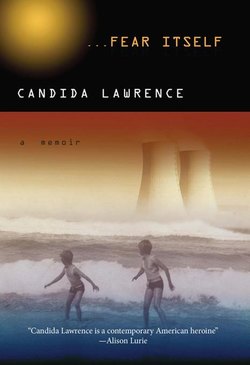Читать книгу Fear Itself - Candida Lawrence - Страница 8
На сайте Литреса книга снята с продажи.
ОглавлениеIt’s August 15, 1945, and my husband and I are sitting on a parched Berkeley hillside staring out at the fog smearing in from the bay. Only last week I liked to say “my husband,” pack a lunch into his black lunch box and make love with him on the weekend. But today I think “The man is crying” and I’m tired of comforting him.
He began crying on August 9, the day we dropped the bomb on Nagasaki, and his lovely blue eyes have been shot with blood ever since. I want very much to speak my mind but know I won’t. I’m wife and woman and I’m supposed to comfort, not deliver moral lectures or various versions of I-told-you-so. I myself haven’t cried since my beloved cousin was killed in an Army Air Corps training accident early in the war.
This man sitting beside me is crumpled, his thin back bent over his knees; he needs a shave, and I fear the form his recovery will take. He will say soon, perhaps this afternoon, that he really had no choice. He had to go off every day and make plutonium because, although he’s only twenty-one, he was a junior physicist and the country was at war; the army wouldn’t take him because he could make plutonium. The government, in fact, would not let him enlist, because what if he were captured and tortured and forced to tell his scientific secrets? And now that the war’s over, the army will insist that he put on a uniform for a year because it feels guilty that he was allowed to pursue a normal life of marriage, lunch box, job making plutonium, while other boys had to leave home and risk their lives.
I have all the information that might lead me into comforting him, but I want instead to stand up and walk away, make myself separate. His hands tremble. He grabs an oak leaf and crumbles it. Black hairs curl around his white fingers. His blue eyes look up at me and they seem to stutter. He tries to focus on my sandal, which frets and pokes at dry grass. He shudders.
“I was doing compartmentalized work. I didn’t know I was making a bomb, didn’t even know I was making plutonium. I had no idea why I was exempt from the Army. Why a second bomb, why didn’t they stop at one, why didn’t they just threaten, why? Why?”
His eyes fill. I have no patience, scant sympathy. I don’t know why I’m so cold. I want him to stand up and say “Back off, government! I’ll do as I wish from now on. Send me to jail, but I will not give you more of my life.” I want him to form a fist and shake it at the sky.
He will not. He will cry—and do as he’s told. I don’t want to make love with him on Saturday night, or go with him when he leaves for Los Alamos or Oak Ridge. I don’t want to be with physicists. Most of them are eldest or only sons who are thin, get colds easily, and have mothers like my mother-in-law. She’s afraid he’ll die if he gets his feet wet.
Now he’s lying down under an oak tree, his forearm covering his eyes. He doesn’t want to look at me. If I lie beside him, that’s comfort. No, I’ll remain sitting up and think about men making things and women comforting and, for the twentieth time since Nagasaki, wonder if our separate activities are in our genes.
And it’s while fog is bringing the scent of eucalyptus to my sinuses and the birds are settling in the branches and the furry sun is slowly sinking into the bay that I begin to feel pompous, foolish, ignorant—a common female scold. Like my mother. Don’t smoke, don’t eat unwashed fruit, you’re coughing because, you’re sick because. Then, though the late afternoon is still warm, I feel chilled. We—the calibrators and comforters—we all made the bomb. Our friends and enemies have worked steadily to create, to discover. The Germans, the English, the Russians, the Americans, the Japanese. He made it, I made it. My ancestors. My descendants will develop something worse. We have to know. We cannot decline. There are those who believe in a God and that their God is good. Could there be a God who has planned our destruction, who knew our end when we used the first tool, the first fire?
“Let’s go home,” he says. “Let’s not eat. Let’s go to bed.” He’s standing above me, holding out his hand. We are twenty-one and twenty, married. I think of candlelight, of skin, mine tanned and smooth, his white and tender, our skins touching—not burned, not scorched or peeling. We shall ride home in our ancient maroon Packard convertible with the chrome Winged Victory leading the way. We will not utter another word until morning.
